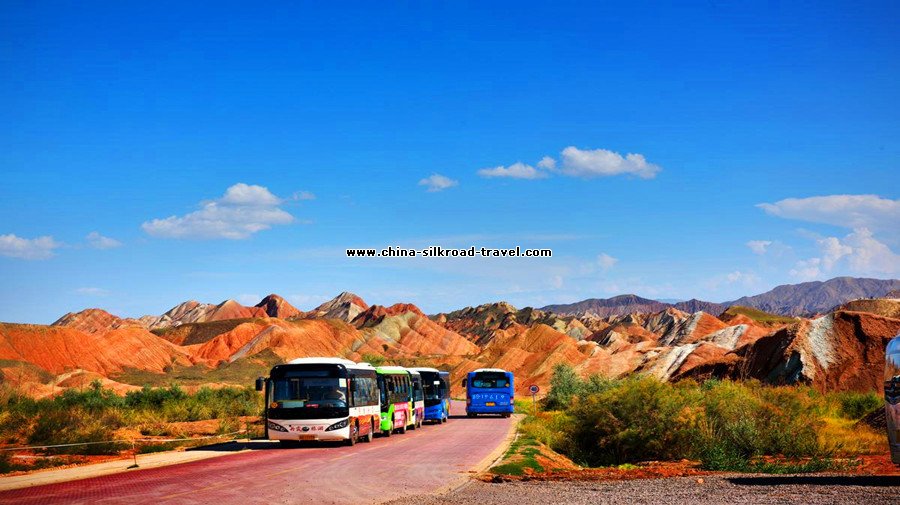Zhangye
Located in northeastern Gansu and i the middle section of the Hexi Corridor, Zhangye was called Ganzhou in ancient times.Lying on the Qilian Mountain to the south,the Hexi an Longshou Mountain in the north and Black River flowing through, all these geographical features contribute to Zhangye’s unique landscape of desert oasis. Zhangye is endowed with flat terrian, fertile soil, luxuriant forests and crops, fragrant fruits and melons. The snow-capped mountains, the grasslands, and the deserts coexist side by side, featuring sceneries both in southern China and in northern frontier.
As praised by some poet: “If one done not see the snow-capped Qilian Mountain,one may think that Ganzhou is in southern China.” Same as many other cities in the Hexi Corridor, Zhangye was also born against the backdrop when the Han general Huo Qubing led the army to conquer the Huns. In the regin of the Emperor Wu of the Han Dynasty (121B.C.) Zhangye was set up as a county and the connotation of the name means “open one’s arms to link up with the Western Regions”. Since then, the imperial court initiated a large immigration and land reclamation program in Zhangye,stationed troops and developed agriculture. This has further promoted the economic and cultural prosperity of both the Central Plains and the Western Regions. Zhangye therefore became an important city on the Silk Road.
As praised by some poet: “If one done not see the snow-capped Qilian Mountain,one may think that Ganzhou is in southern China.” Same as many other cities in the Hexi Corridor, Zhangye was also born against the backdrop when the Han general Huo Qubing led the army to conquer the Huns. In the regin of the Emperor Wu of the Han Dynasty (121B.C.) Zhangye was set up as a county and the connotation of the name means “open one’s arms to link up with the Western Regions”. Since then, the imperial court initiated a large immigration and land reclamation program in Zhangye,stationed troops and developed agriculture. This has further promoted the economic and cultural prosperity of both the Central Plains and the Western Regions. Zhangye therefore became an important city on the Silk Road.

During the Wei and the Jin period,Juqu Mengxun,military commander of the Huns,established the Northern Liang Kingdom and designed Zhangye the capital. He put a great deal of effects in agricultural development. He supported Confucianism and expanded exchanges with western region countries. He promoted Buddhism and authorized to build grottoes. Moreover,he created Qinhanji, a new type of musical performance by combining local music and dance with ancient Qiuci music. Zhangye hence emerged unprecedented prosperity in cultural development. During the Western Wei Period, Zhangye was renamed Ganzhou. With the prosperity of the silk road during the Sui and the Tang dynasties, Zhangye further became an important external trade center. The eminent monk Xuan Zang once visited Zhangye on his way to west to Tianzhu for Buddhism scriptures.
A few poets in Chinese history like Wang Wei,Gao Shi, Cen Shen and Ma Yunqi had all stayed in Gan Zhou invariably where they left fine literature works behind. The well-known music piece Colorful Plumage Dance (Ni Shang Yu Yi Wu) adapted by Emperor Xuanzang of the Tang Dynasty based on the Ganzhou lical music brahman Buddhist Songs after it was introduced to imperial palace. During the Northern Song Dynasty, Li Yuanhao, head of the Dangxiang ethnic people, established the Western Xia Kingdom. He authorized to build a large Buddhist monastery in Ganzhou named Big Buddhist Temple. The Sakymuni Niravana Statue placed in the temple is the largest in the world. The Reclining Buddha has a wooden bade and clay cover painted in gold.
A few poets in Chinese history like Wang Wei,Gao Shi, Cen Shen and Ma Yunqi had all stayed in Gan Zhou invariably where they left fine literature works behind. The well-known music piece Colorful Plumage Dance (Ni Shang Yu Yi Wu) adapted by Emperor Xuanzang of the Tang Dynasty based on the Ganzhou lical music brahman Buddhist Songs after it was introduced to imperial palace. During the Northern Song Dynasty, Li Yuanhao, head of the Dangxiang ethnic people, established the Western Xia Kingdom. He authorized to build a large Buddhist monastery in Ganzhou named Big Buddhist Temple. The Sakymuni Niravana Statue placed in the temple is the largest in the world. The Reclining Buddha has a wooden bade and clay cover painted in gold.
After Gansu Province was established during the Yuan Dynasty, Ganzhou became a vital hub in the Hexi Corridor and a city of transit trade for tea. The commercial network was quite advanced and the trade was busy. The Italian traveler Marco Polo on his way on Shangdu stopped over in Ganzhou for a year. In The Traveler od Marco Polo,he described the city’s prosperity and its magnificent temples.
During the Ming and the Qing dynasties, Ganzhou was the military suppy bade in the northwest and the political,military and economic center if the Hexi region. The city not only enjoyed continued commercial prosperity,but also became the largest distribution center for livestock products in the northwest. The Merchants from nationwide to other broad areas of Xinjiang and Mongolia in northwest China.
During the Ming and the Qing dynasties, Ganzhou was the military suppy bade in the northwest and the political,military and economic center if the Hexi region. The city not only enjoyed continued commercial prosperity,but also became the largest distribution center for livestock products in the northwest. The Merchants from nationwide to other broad areas of Xinjiang and Mongolia in northwest China.
Silk Road Travel Guide
Our Blog
- Silk Road Tours in 2020
- Silk Road Tour for Senior Citizens
- Silk Road Train Tours
- Silk Road Private Tour
- Silk Road Travel from Australia
- Silk Road Tour from Malaysia
- The First Skating Ceremony of Hemu ...
- Southern Xinjiang Travel Experience...
- Our Tour to Xinjiang Province II
- Xinjiang Tour Story from Singapore ...



